ACM Technology Policy Council Member Bios
Virginia Dignum
Co-Chair
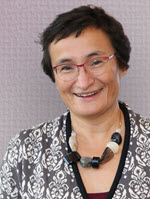 Virginia Dignum is professor of Artificial Intelligence at Umeå University, scientific director of the Wallenberg AI, Autonomous Systems and Software Program – Humanities and Society (WASP-HS), co-founder of ALLAI, member of the European High Level Expert group on AI and of the World Economic Forum AI Board, and currently working as an expert advisor for UNICEF.
Virginia Dignum is professor of Artificial Intelligence at Umeå University, scientific director of the Wallenberg AI, Autonomous Systems and Software Program – Humanities and Society (WASP-HS), co-founder of ALLAI, member of the European High Level Expert group on AI and of the World Economic Forum AI Board, and currently working as an expert advisor for UNICEF.
Dr. Dignum is an Associate Professor at the Faculty of Technology, Policy and Management, Delft University of Technology. She received a PhD in 2004 from the Utrecht University, on A Model for Organizational Interaction. Prior to her PhD, Virginia worked for more than 12 years in consultancy and system development in the areas of expert systems and knowledge management.
Her current research focus is on the specification, verification and monitoring of ethical and societal principles for intelligent autonomous systems. She is committed to policy and awareness efforts towards the responsible development and use of AI, as member of the European Commission High Level Expert Group on Artificial Intelligence, the working group on Responsible AI of the Global Partnership on AI (GPAI), the World Economic Forum’s Global Artificial Intelligence Council, lead for UNICEF's guidance for AI and children, the Executive Committee of the IEEE Initiative on Ethically Aligned Design, and as founding member of ALLAI, the Dutch AI Alliance. Her book “Responsible Artificial Intelligence: developing and using AI in a responsible way” was published by Springer-Nature in 2019.
Jeanna Neefe Matthews
Co-Chair
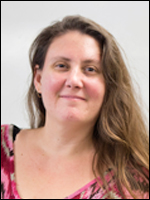 Jeanna Matthews is a professor of computer science at Clarkson University and an affiliate at Data and Society. She has published work in a broad range of systems topics from virtualization and cloud computing to social media security and distributed file systems. She has been a four-time presenter at DEF CON on topics including security vulnerabilities in virtual environments (2015 and 2016), adversarial testing of criminal justice software (2018) and trolling (2018). She is an ACM Distinguished Speaker, a Fulbright Specialist and a founding co-chair of the ACM Technology Policy Subcommittee on Artificial Intelligence and Algorithm Accountability.
Jeanna Matthews is a professor of computer science at Clarkson University and an affiliate at Data and Society. She has published work in a broad range of systems topics from virtualization and cloud computing to social media security and distributed file systems. She has been a four-time presenter at DEF CON on topics including security vulnerabilities in virtual environments (2015 and 2016), adversarial testing of criminal justice software (2018) and trolling (2018). She is an ACM Distinguished Speaker, a Fulbright Specialist and a founding co-chair of the ACM Technology Policy Subcommittee on Artificial Intelligence and Algorithm Accountability.
She has been a member of the ACM Council (2015-present), chair of the ACM Special Interest Group Governing Board ( 2016-2018) and the the chair of the ACM Special Interest Group on Operating Systems (SIGOPS) from 2011 to 2015. Her current work focuses on securing societal decision-making processes and supporting the rights of individuals in a world of automation. She received a 2018-2019 Brown Institute Magic Grant to research differences in DNA software programs used in the criminal justice system. Jeanna received her Ph.D. in Computer Science from the University of California at Berkeley in 1999, a B.S. in Mathematics and Computer Science from Ohio State University in 1994 and a B.A. in Spanish from the State University of New York at Potsdam in 2015.
Expertise: virtualization, cloud computing, computer security, computer networks, operating systems, software accountability and transparency
James Hendler
Past Chair
 James Hendler is the Director of the Institute for Data Exploration and Applications and the Tetherless World Professor of Computer, Web and Cognitive Sciences at RPI. He also heads the RPI-IBM Center for Health Empowerment by Analytics, Learning and Semantics (HEALS) and serves as a Chair of the Board of the UK’s charitable Web Science Trust. Hendler has authored over 400 books, technical papers and articles in the areas of Semantic Web, artificial intelligence, agent-based computing and high-performance processing. One of the originators of the “Semantic Web,” Hendler was the recipient of a 1995 Fulbright Foundation Fellowship, is a former member of the US Air Force Science Advisory Board, and is a Fellow of the AAAI, BCS, the IEEE, the AAAS and the ACM. He is also the former Chief Scientist of the Information Systems Office at the US Defense Advanced Research Projects Agency (DARPA) and was awarded a US Air Force Exceptional Civilian Service Medal in 2002. He is also the first computer scientist to serve on the Board of Reviewing editors for Science. In 2010, Hendler was named one of the 20 most innovative professors in America by Playboy magazine and was selected as an “Internet Web Expert” by the US government. In 2013, he was appointed as the Open Data Advisor to New York State and in 2015 appointed a member of the US Homeland Security Science and Technology Advisory Committee. In 2016, became a member of the National Academies Board on Research Data and Information and in 2018 was elected a Fellow of the National Academy of Public Administration. He served as chair of the ACM’s US Technology Policy Committee from 2018-2021.
James Hendler is the Director of the Institute for Data Exploration and Applications and the Tetherless World Professor of Computer, Web and Cognitive Sciences at RPI. He also heads the RPI-IBM Center for Health Empowerment by Analytics, Learning and Semantics (HEALS) and serves as a Chair of the Board of the UK’s charitable Web Science Trust. Hendler has authored over 400 books, technical papers and articles in the areas of Semantic Web, artificial intelligence, agent-based computing and high-performance processing. One of the originators of the “Semantic Web,” Hendler was the recipient of a 1995 Fulbright Foundation Fellowship, is a former member of the US Air Force Science Advisory Board, and is a Fellow of the AAAI, BCS, the IEEE, the AAAS and the ACM. He is also the former Chief Scientist of the Information Systems Office at the US Defense Advanced Research Projects Agency (DARPA) and was awarded a US Air Force Exceptional Civilian Service Medal in 2002. He is also the first computer scientist to serve on the Board of Reviewing editors for Science. In 2010, Hendler was named one of the 20 most innovative professors in America by Playboy magazine and was selected as an “Internet Web Expert” by the US government. In 2013, he was appointed as the Open Data Advisor to New York State and in 2015 appointed a member of the US Homeland Security Science and Technology Advisory Committee. In 2016, became a member of the National Academies Board on Research Data and Information and in 2018 was elected a Fellow of the National Academy of Public Administration. He served as chair of the ACM’s US Technology Policy Committee from 2018-2021.
Expertise: artificial intelligence, robotics, and semantic web
Michel Beaudouin-Lafon
Europe TPC Chair
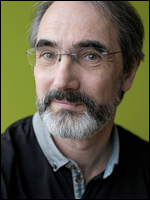 Michel Beaudouin-Lafon is Professor of Computer Science, Classe Exceptionnelle, at Université Paris-Sud and a senior fellow of Institut Universitaire de France. He has worked in human-computer interaction for over 30 years and is a member of the ACM SIGCHI Academy. His research interests include fundamental aspects of interaction, novel interaction techniques, computer-supported cooperative work and engineering of interactive systems. He has published over 180 papers and is an ACM Distinguished Speaker. He heads the 22M€ Digiscope project and is the laureate of an ERC Advanced Grant. Michel was director of LRI, the laboratory for computer science joint between Université Paris-Sud and CNRS, and now heads the Human-Centered Computing lab at LRI. He is also chair of the department of Computer Science at Université Paris-Saclay (2400 faculty, staff and Ph.D. students). He founded AFIHM, the Francophone association for human-computer interaction and has been active in ACM and SIGCHI for over 20 years, including the editorial boards of ACM Books and ACM TOCHI, the ACM Council, ACM Publications Board, ACM Europe Council and Europe TPC. He served as Technical Program Co-chair for CHI 2013 in Paris (3500 participants) and received the ACM SIGCHI Lifetime Service Award in 2015.
Michel Beaudouin-Lafon is Professor of Computer Science, Classe Exceptionnelle, at Université Paris-Sud and a senior fellow of Institut Universitaire de France. He has worked in human-computer interaction for over 30 years and is a member of the ACM SIGCHI Academy. His research interests include fundamental aspects of interaction, novel interaction techniques, computer-supported cooperative work and engineering of interactive systems. He has published over 180 papers and is an ACM Distinguished Speaker. He heads the 22M€ Digiscope project and is the laureate of an ERC Advanced Grant. Michel was director of LRI, the laboratory for computer science joint between Université Paris-Sud and CNRS, and now heads the Human-Centered Computing lab at LRI. He is also chair of the department of Computer Science at Université Paris-Saclay (2400 faculty, staff and Ph.D. students). He founded AFIHM, the Francophone association for human-computer interaction and has been active in ACM and SIGCHI for over 20 years, including the editorial boards of ACM Books and ACM TOCHI, the ACM Council, ACM Publications Board, ACM Europe Council and Europe TPC. He served as Technical Program Co-chair for CHI 2013 in Paris (3500 participants) and received the ACM SIGCHI Lifetime Service Award in 2015.
Expertise: Human-Computer Interaction
Simson Garfinkel
TechBriefs Chair
 Simson Garfinkel researches and writes at the intersection of AI, privacy, and digital forensics. He is a fellow of the AAAS, the ACM and the IEEE. He earned his PhD in Computer Science at MIT and a Master of Science in Journalism at Columbia University.
Simson Garfinkel researches and writes at the intersection of AI, privacy, and digital forensics. He is a fellow of the AAAS, the ACM and the IEEE. He earned his PhD in Computer Science at MIT and a Master of Science in Journalism at Columbia University.
Larry Medsker
USTPC Chair
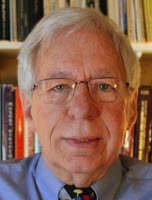 Medsker is Research Professor in the Human-Technology Collaboration Lab and PhD program at George Washington University, and Founding Director of its Master's Program in Data Science. He is also Policy Officer for ACM's Special Interest Group on Artificial Intelligence.
Medsker is Research Professor in the Human-Technology Collaboration Lab and PhD program at George Washington University, and Founding Director of its Master's Program in Data Science. He is also Policy Officer for ACM's Special Interest Group on Artificial Intelligence.
Thomas Zimmermann
SIG Representative
 Thomas Zimmermann is a Chancellor’s Professor and Bren Chair at the University of California, Irvine. He works on cutting-edge research and innovation in software engineering, machine learning, artificial intelligence, data science, and digital games. He has over 15 years of experience in the field, with more than 100 publications that have been cited over 30,000 times. His research mission is to empower software developers and organizations to build better software and services with AI. He is best known for his pioneering work on systematic mining of software repositories and his empirical studies of software development in industry. He has contributed to several Microsoft products and tools, such as Visual Studio, GitHub, and Xbox. He is an ACM Fellow, an IEEE Fellow, and recipient of the IEEE TCSE Edward J. McCluskey Technical Achievement award.
Thomas Zimmermann is a Chancellor’s Professor and Bren Chair at the University of California, Irvine. He works on cutting-edge research and innovation in software engineering, machine learning, artificial intelligence, data science, and digital games. He has over 15 years of experience in the field, with more than 100 publications that have been cited over 30,000 times. His research mission is to empower software developers and organizations to build better software and services with AI. He is best known for his pioneering work on systematic mining of software repositories and his empirical studies of software development in industry. He has contributed to several Microsoft products and tools, such as Visual Studio, GitHub, and Xbox. He is an ACM Fellow, an IEEE Fellow, and recipient of the IEEE TCSE Edward J. McCluskey Technical Achievement award.
He received his PhD in 2008 from Saarland University in Germany. From 2007 to 2008 he was an Assistant Professor in the Department of Computer Science at the University of Calgary and from 2008 to 2024 he worked at Microsoft Research. His homepage is http://thomas-zimmermann.com. Follow him on X @tomzimmermann.
Eelco Herder
SIG Representative
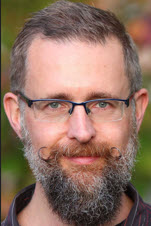 Eelco Herder is an Associate Professor in the Interaction Group at Utrecht University, the Netherlands. His research focuses on the fine balance between the benefits of personalization and perceived and actual risks. Particularly, he investigates the long-term effects of how users and current (commercial) recommender systems and related online platforms interact with one another, and which mechanisms help to encourage users to better engage in active decision-making. Since 2023, Eelco serves as Chair of ACM SIGWEB.
Eelco Herder is an Associate Professor in the Interaction Group at Utrecht University, the Netherlands. His research focuses on the fine balance between the benefits of personalization and perceived and actual risks. Particularly, he investigates the long-term effects of how users and current (commercial) recommender systems and related online platforms interact with one another, and which mechanisms help to encourage users to better engage in active decision-making. Since 2023, Eelco serves as Chair of ACM SIGWEB.
Meenakshi D'Souza
At-Large Member
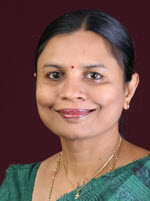 Meenakshi is a Professor and HoD (Department of Computer Science) at IIIT Bangalore and the President of the ACM India Council. Her research interests are in Formal Methods, Model Based Development for embedded software and Software Testing. She is also interested in gender diversity and accessibility issues in IT. Meenakshi has worked on several research projects on formal verification of various Indian government and R&D organizations. Meenakshi teaches courses on Software Testing, Automata theory and Computability, Discrete Mathematics, Graph Theory and Design and Analysis of Algorithms in the institute. Meenakshi's course on Software Testing has been offered on the NPTEL, Swayam platform since 2017 and more than 70,000 learners have enrolled for this course over the years. Meenakshi also teaches in the online B. Sc. degree program of IIT Madras. Meenakshi is a recipient of the ACM India Outstanding Contributions to Computing Education award 2024.
Meenakshi is a Professor and HoD (Department of Computer Science) at IIIT Bangalore and the President of the ACM India Council. Her research interests are in Formal Methods, Model Based Development for embedded software and Software Testing. She is also interested in gender diversity and accessibility issues in IT. Meenakshi has worked on several research projects on formal verification of various Indian government and R&D organizations. Meenakshi teaches courses on Software Testing, Automata theory and Computability, Discrete Mathematics, Graph Theory and Design and Analysis of Algorithms in the institute. Meenakshi's course on Software Testing has been offered on the NPTEL, Swayam platform since 2017 and more than 70,000 learners have enrolled for this course over the years. Meenakshi also teaches in the online B. Sc. degree program of IIT Madras. Meenakshi is a recipient of the ACM India Outstanding Contributions to Computing Education award 2024.
Meenakshi did her Master’s in Mathematics from University of Madras, Chennai and her Ph. D. in Theoretical Computer Science from The Institute of Mathematical Sciences, Chennai. Prior to joining IIIT Bangalore, Meenakshi worked in the research department of Honeywell Technology Solutions, Bangalore.
Mohan Kankanhalli
At-Large Member
 Mohan Kankanhalli is Provost's Chair Professor of Computer Science at the National University of Singapore (NUS), where he is the Director of the NUS AI Institute. He is also the Deputy Executive Chairman of AI Singapore, which is Singapore’s National AI R&D Program. Mohan obtained his BTech from IIT Kharagpur and MS & PhD from the Rensselaer Polytechnic Institute. Mohan’s research interests are in Multimodal Computing, Computer Vision, and Trustworthy AI. He has made fundamental contributions in the areas of image and video understanding, visual saliency, content authentication, privacy, and trustworthy AI. As Director of NUS AI Institute, he leads initiatives on multimodal models and trustworthy machine learning. He is also engaged in leadership roles in multimedia computing such as being the Senior Editor of ACM Transactions on Multimedia Computing journal and the Associate Editor-in-Chief of IEEE Multimedia magazine. Mohan was a member of World Economic Forum's 2023-2024 Global Future Council on the Future of Artificial Intelligence. He is a Fellow of IEEE, IAPR and ACM.
Mohan Kankanhalli is Provost's Chair Professor of Computer Science at the National University of Singapore (NUS), where he is the Director of the NUS AI Institute. He is also the Deputy Executive Chairman of AI Singapore, which is Singapore’s National AI R&D Program. Mohan obtained his BTech from IIT Kharagpur and MS & PhD from the Rensselaer Polytechnic Institute. Mohan’s research interests are in Multimodal Computing, Computer Vision, and Trustworthy AI. He has made fundamental contributions in the areas of image and video understanding, visual saliency, content authentication, privacy, and trustworthy AI. As Director of NUS AI Institute, he leads initiatives on multimodal models and trustworthy machine learning. He is also engaged in leadership roles in multimedia computing such as being the Senior Editor of ACM Transactions on Multimedia Computing journal and the Associate Editor-in-Chief of IEEE Multimedia magazine. Mohan was a member of World Economic Forum's 2023-2024 Global Future Council on the Future of Artificial Intelligence. He is a Fellow of IEEE, IAPR and ACM.
Edson Prestes
At-Large Member
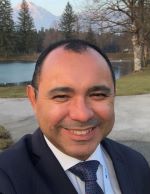 Edson Prestes is Full Professor at Institute of Informatics of the Federal University of Rio Grande do Sul, Brazil. He is leader of the Phi Robotics Research Group and CNPq Research Fellow. He received his BSc in Computer Science from the Federal University of Pará (1996), Amazon, Brazil, and MSc (1999) and PhD (2003) in Computer Science from Federal University of Rio Grande do Sul, Brazil. Edson is Senior Member of the IEEE Robotics and Automation Society (IEEE RAS) and IEEE Standards Association (IEEE SA).
Edson Prestes is Full Professor at Institute of Informatics of the Federal University of Rio Grande do Sul, Brazil. He is leader of the Phi Robotics Research Group and CNPq Research Fellow. He received his BSc in Computer Science from the Federal University of Pará (1996), Amazon, Brazil, and MSc (1999) and PhD (2003) in Computer Science from Federal University of Rio Grande do Sul, Brazil. Edson is Senior Member of the IEEE Robotics and Automation Society (IEEE RAS) and IEEE Standards Association (IEEE SA).
Throughout his career, Edson has been working on several initiatives related to Standardization, Robotics, Artificial Intelligence and Ethics of Artificial Intelligence in Academia, Industry, International and Multilateral Organizations. For instance, Edson is High Level Expert of Global Commission on Responsible Artificial Intelligence in the Military Domain; South America Ambassador at IEEE TechEthics; Chair of the IEEE RAS/SA 7007 - Ontologies for Ethically Driven Robotics and Automation Systems Working Group; Vice-Chair of the IEEE RAS/SA Ontologies for Robotics and Automation Working Group; Former Member of the United Nations Secretary-General’s High-level Panel on Digital Cooperation; Former Member of the UNESCO Ad Hoc Expert Group (AHEG) for the Recommendation on the Ethics of Artificial Intelligence, Former Member of the Global Future Council on the Future of Artificial Intelligence and of the Cross-Global Future Council Working Group on the G20 Digital Agenda at World Economic Forum. Additional information can be found at www.inf.ufrgs.br/~prestes/ or https://www.linkedin.com/in/edson-prestes/.
Publish with ACM
ACM's prestigious conferences and journals seek top-quality papers in all areas of computing and IT. It is now easier than ever to find the most appropriate venue for your research and publish with ACM.
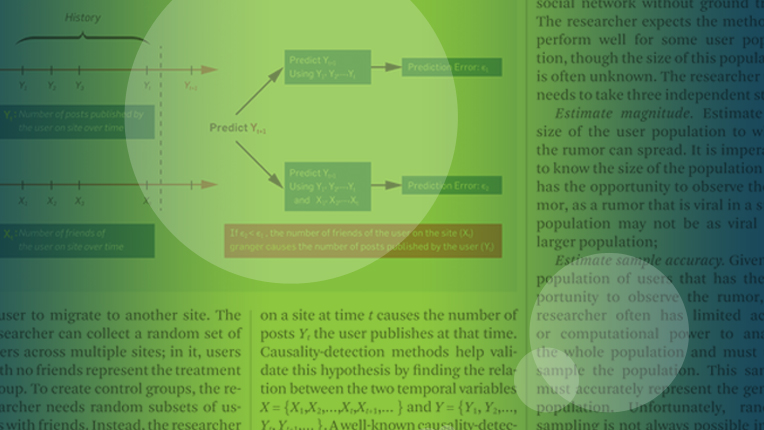
Lifelong Learning
ACM offers lifelong learning resources including online books and courses from Skillsoft, TechTalks on the hottest topics in computing and IT, and more.

